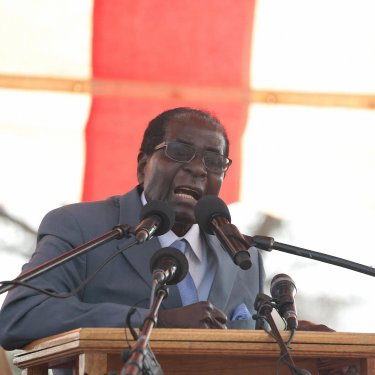RSF decries Zimbabwean government’s harassment of journalists

Reporters Without Borders (RSF) condemns the harassment of journalists in recent weeks by President Robert Mugabe’s government and the ruling ZANU-PF party. Journalists have been the targets of intimidation attempts, physical attacks and arrests without justification.
The harassment is related to a wave of anti-government protests that began several months ago and were sparked by revelations about the vast sum (more than 700,000 euros) that the state lavished on Mugabe’s 92nd birthday celebrations despite a deep economic crisis.
Pastor Evan Mawarire is the figurehead of this new wave of opposition. After criticizing the regime’s flaws in a series of Internet posts, Mawarire was arrested on 12 July on a charge of trying to overthrow the government and was held for 48 hours until a Harare court dismissed the case.
As a result of the growing grass-roots opposition, the authorities are clamping down on all those perceived as possible critics of the government and ZANU-PF – including journalists.
“We condemn the violence against journalists,” RSF said. “Far from condemning these excesses, the president condones them because he identifies journalists with the opposition and does not recognize their public service function. After the latest case at his rally he said: ‘To journalists I say go and tell those who you are representing that (...) Mugabe is still here.’
“We call on the Zimbabwean judicial authorities to conduct an investigation into all this violence in order to end the impunity for abuses against journalists, abuses that clearly violate both the country’s constitution and its laws.”
ZANU-PF members act with impunity
The latest victim was Daily News reporter Mugove Tafirenyika, who was badly beaten by young ZANU-PF members acting as security enforcers at a political meeting in Harare on 27 July. He had just taken a photo of an altercation between the youths and a politician who had himself taken a photo of the VIP tent where Mugabe was. When Tafirenyika refused to delete his photo on the grounds that he had official accreditation, the youths attacked him. The other journalists present then left the meeting in solidarity with Tafirenyika.
Stones and clubs were used to attack Albert Masaka, a journalist with the daily NewsDay, when he attended a ZANU-PF meeting in Chitungwiza, a town a few kilometres outside Harare, on 18 June. The police intervened but failed to arrest his young attackers, who left with his equipment.
Five journalists – Edgar Gweshe, Garikai Chauza, James Jemwa, Khumbulani Zamuchiya and Chris Mahove – were arrested on 26 June while covering one of the regular protests outside Harare’s luxurious Rainbow Towers Hotel. The protesters want to evict second Vice-President Phelekezela Mphoko, who has been living there for nearly two years and has run up a tab of several hundred thousand dollars. When Agence France-Presse reporter Farai Mugano went to cover the protest on 14 July, he was arrested and was later released without charge.
Censorship does not spare foreign journalists
Alex Crawford, a visiting reporter for Britain’s Sky News, and her cameraman, Garwen McLuckie, were deported on 13 July although they had permission to come and do a report in Zimbabwe. They were arrested after interviewing Pastor Mawarire and were taken straight to the airport, where they were held for 12 hours without being allowed to talk to their lawyer. Their equipment was searched and some of their papers were photographed. Far from apologizing, information minister George Charamba told AFP: “They breached our laws, we kicked them out. You don’t enter a country without accreditation.”
Mugabe is on RSF’s list of 40 “predators of press freedom”, while Zimbabwe is ranked 124th out of 180 countries in RSF’s 2016 World Press Freedom Index.



